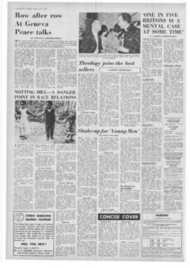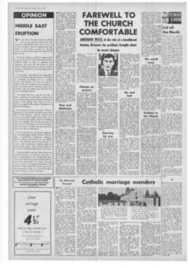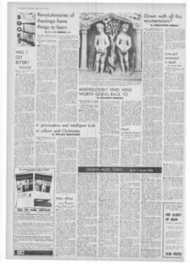Page 4, 9th June 1967
Page 4

Report an error
Noticed an error on this page?If you've noticed an error in this article please click here to report it.
Tags
Share
Related articles
How To Bridge That Clergy Laity Gulf
The Layman's Viewpoint By Donald Mcchesney
`not Just A Churchgoer, But A Missioner To An...
Liturgy And Laity
Obsol Ete Study Of Community Concepts
FAREWELL TO THE CHURCH COMFORTABLE
ANTHONY PETTI, in the role of a bewildered layman, discusses the problems brought about by recent changes
ONLY a few years ago, the Catholic layman, the rank-and-filer at the bottom of a powerful pyramidal chain of command, was treated as a tender sheep to be penned in a large safe fold, or as a toddling infant to be firmly reined by allknowing Mother Church. He was a member of the Church Comfortable.
Now he has suddenly been told to become a shepherd, to grow up overnight into a selfreliant adult. He could .be tempted to feel himself a member of the Church Chaotic. More changes in Catholicism have occurred in one decade than possibly in the last 300 years. Beneficial though most of these are, they have been accompanied by a sudden slackening of authoritarianism and a consequent flood of diverse and vociferous opinions on all fundamental issues.
The main body of laity, everenduring and ever faithful. whether nurtured from birth, drilled in school or primed by conversion, has undoubtedly experienced a trauma, the effects of which will take a considerable time to heal, especially since the main force of change has not yet fully penetrated.
Ours was The Church, the panacea for every problem, with unvarying universality and conformity in dogma, morality and liturgy, even down to the minutest detail. For English Catholics there was, in addition, the "penny Catechism," the poor man's Summa, sufficient to repel doubters and scoffers.
Atheist friends would exclaim (and how guilty one felt of consorting with them): "You ruddy Catholics are brainwashed like the Commies; you all give the same answer." The Church's authoritarianism might blinker. but it provided a complete set of values in a world where few existed. it offered absolute truth. where truth was generally considered to be only relative.
Fear and disillusion
For the older and traditionalist Catholics at least. it is as if the ground had suddenly been swept from under them: as if the Church had turned on them for behaving as it had always taught them to behave. The priest who had once movingly urged us to hold fast to the "Rock that does not roll" was now accusing us of treating our Church "as a teddy bear."
It is precisely because of the past rigidity of teaching on every conceivable issue, often uttered seemingly ex cathedra by anyone in a clerical collar, sometimes in the shadow of ipso facto excommunication, that our present "freedom," such as it is. fills us with bewilderment, fear and, in a few cases, disillusionment Are we as much prone to changes in doctrine and outlook as we are to those in dress and the shape of cars? And if we think the changes sensible, we then ponder why it has taken so many centuries to introduce them. Does the Church truly subsist unchanged in all ages, or does it became a victim of society? What is permanent, and what is unimportant? If our pastors seem unsure, what are we poor clods to think?
Unless blessed with remarkably bad memories, we have consciously to erase from our minds even very recent teachings of the Church; otherwise, rather like the pathetic Winston in 1984, we are faced with the problem of new-talk and double-think.
For instance we have to forget past statements on the burning issue of birth-control —a subject discussed ad nauseam by the experts but with little effect for the odd 95 per cent of our brethren whom it acutely concerns.
The Church now gives full blessing to the "safe period." But as late as 1957 if not later, the use of the "safe period" was not permitted except for very serious cause, and our C.T.S. pamphlets told us so. So did the Catholic Marriage Advisory Council in its talks for engaged couples, who were even warned not to read about it.
Change on prayers
We also have to forget how we had to defend rigorously the official attitude to mixed marriages, the injunction against participating or even attending NON-CATHOLIC services, the prominence given to Papal infallibility. Now the Pope himself, with supreme humility implies our emphasis has been wrong.
Our attitude to devotion and prayer has also changed drastically and with marked rapidity. Many of us are almost ashamed of uttering the Hail Mary (not so the million at Fatima), whereas only 10 years ago, especially with the Peyton crusades, one felt a criminal if one did not say the Rosary daily. Are we seeing prayer in a truer perspective, or simply taking a soft option in minimising it'?
The same may be asked of fasting. Most of us remember the emotional shock involved in the benefit of no longer fasting for 12 hours before receiving Communion (or is it Eucharist?) and then having the threehour period whittled to one, a token which is virtually pointless. Prescribed fasting, in general, is so minimal as to be of no longer duration or inconvenience than a sneeze. It is wise to make fasting functional, but a couple of familyfast days a year is scarcely adequate. Perhaps it should be left to the individual to do as he thinks best, but it is the duty of the Church to organise and persist in something so worthwhile.
If we the laity have not achieved bewilderment, we have it thrust upon us. Doubts are cast on the vital elements of the Faith, on the nature of transubstantiation, the number and quality of the sacraments. the distinction between mortal and venial sin: once a matter of eternal life or death.
Bright young theologians (or at least well-preserved ones) offer subtle reinterpretations wrapped in a thick cotton wool of abstraction and blurred by tissues of contradictions. And now we actually have the unbelievable necessity of reaffirming the doctrine of transubstantiation.
Dogma has become a grubby irrelevance, and one is made to feel a mediaeval "square" in defending traditional doctrines, as for instance trying to justify to a new-wave priest (presbyter?) the value of Confession or Penance or whatever we shall eventually call it. assuming it survives.
We watch with amazement and sympathy the unequal clerical boxing-match on the subject of priest marriage (though a revengeful layman might think: you too can have the problem of birth control in your very home; and a financially harassed layman will wonder how to support a clergy house of 16 children and afford their education at Catholic Public Schools or finishing convents). Soon a married layman will steal the act and announce in the popular press: "I am renouncing my wife and family to become a priest; and if I'm excommunicated I'll become an Anglican."
Grieving for you The baffled laity could also have cause to wonder at some of our major enlightened gestures. With strange magnanimity, marred by political animosity, we exonerated the Jews from responsibility for Christ's death, as if, until the Vatican Council we had actually blamed them. It would have been more appropriate to make a strong affirmation of love and brotherhood backed by forceful deeds, and to say "we grieve with you for the recent mutilation of your race: forgive us for our inadequacies."
Our efforts at Christian unity are noble but limited, reaching little beyond denominations with hardly more practising members than churches. We grandly accept the Revised Standard Version and immediately label it "Catholic Edition." Some of our tiny inno vations are ludicrous, as when there was the recent pantomime of adding, subtracting, adding and subtracting again the Amen at the end of the Pater Nosier (sorry, Our Father or Lord's Prayer).
The full force of flux has obviously not hit us all in England in equal proportion. Attend a sermon preached to intelligentsia and you may hear a mini-Luther, a suped-up Savanarola or a suave Zwingla Elsewhere you can still bear sermons of simple piety and practical charity.
More seriously, this unevenness is present in our schools. Some teach a new outlook still in embryo stage, others make their five-year-olds recite: "God is the supreme Spirit," which is repeated by the bemused pupil : "God is a sucream syrup."
Sin and hell
For some children the idea of sin and hell is minimised. For others life is shown to be a terrible tussle between a horny little devil perched on the left shoulder and a PreRaphaelite guardian angel floating above one's head, while a Jiminy Cricket of a conscience bobs about in the heart or tummy. Our reformers are not much more enlightened on the conscience. They imagine it is the layman's infallible yardstick (e.g., solving the birth control issue). But the conscience, whose existence rationalists would doubt, certainly becomes dulled left to its own devices, and is strongly conditioned by society. Would our churches remain filled for long on Sundays or any other day. if obligation of attendance were removed? Or would they become as cavernously empty as those of our Anglican brothers?
Tragically, a few of the recent advances are an ironic illusion. The relaxation of authority has given every would-be new-thinker an opportunity to thrust his own authoritarian doctrine down our throats, while those who attack dogma are remarkably dogmatic about it.
The laity is supposed to take a more active part in running the Church, but has so far been entrusted with little more than reading a lesson (which we do rather badly, so heaven help us if we preach). Where is the deaconate? Except in isolated cases, do we elect any of our pastors? We may not be equipped to do so as a body: after all, we made bad political choices.
Did we have any real say in the Vatican Council? Did all our bishops ascertain what we thought or felt? Can we know what is good for us, and decide policy? Should we ask the intellectuals to be the spokesmen? Many would say perish the thought, and certainly, some of our noisiest "thinking laymen" are also the most tiresome or dangerous.
And does the intellectual elite come running or do we find them in such bodies as the Newman? In any case the distinction between intellectual and emotional Catholicism is a harmful one, and also encourages a defence mechanism of extreme counterpoise. Attend a sherry party of "rational Catholics" and the temptation is to drown discussion by loudly singing the Lourdes hymn in an impossibly high key.
Attend a parish meeting when reinforced nylon cords for rosaries are discussed and one wants to interject: "Have you seen what the Dutch Catechism really says in the original? It's not as progressive as we thought."
The world cares
Despite our bewilderment, the traffic jams of left, right, middle-of-the-road, top speeds, reverse gear and halt signs, we have, by the grace of God, much to be thankful for. The outside world actually cares what the Church does. It listens attentively (but does nothing) when the Pope begs for peace, whereas the frequent heartfelt pleas of Pius XII fell on deaf and bored ears.
A stirring pastoral letter on practical charity makes important radio and r.V. news, though reported as if we had never before tried to preach and practise such good works. A theologian known only to a handful of his fellow English Catholics rockets to international fame, though to our discomfort and his distress.
We have our troubles, but there was, after all, a dust-up at Nicea, fire and sword at the Reformation, and Augustine had many fierce scraps with Jerome. Once again the upheavals will subside to reveal a strengthened Church.
Faithful to the Church
Come what may, though unsettled by change—as well as trying to cope with the sheer effort of living, raising a family, keeping a job, paying the rent or mortgage—the laity wants to remain ever trusting, patient and faithful to the Church, thankful to be reminded of basic Christian precepts of love, charity, mercy and forgiveness.
It has no spokesman. no Ombudsman, as yet. If it did have a voice, it might plead that we learn from our mistakes: that by wisdom, we no longer teach at one moment inflexible absolute doctrines which are to be suddenly swept away; that by foresight, major changes are not made at the eleventh hour and then all of a rush; that the laity, where possible, be consulted and not presented with a fait accompli; that they be neither browbeaten nor given a sudden vast freedom beyond their capacity to bear; that they be treated neither as pygmies nor giants; that they participate more fully though not necessarily rule; that they swiftly regain a unity of outlook and purpose for themselves and their children; that they never have cause to cry out in anguish: "Show me, dear Christ, thy Spouse so bright and clear."
blog comments powered by Disqus











